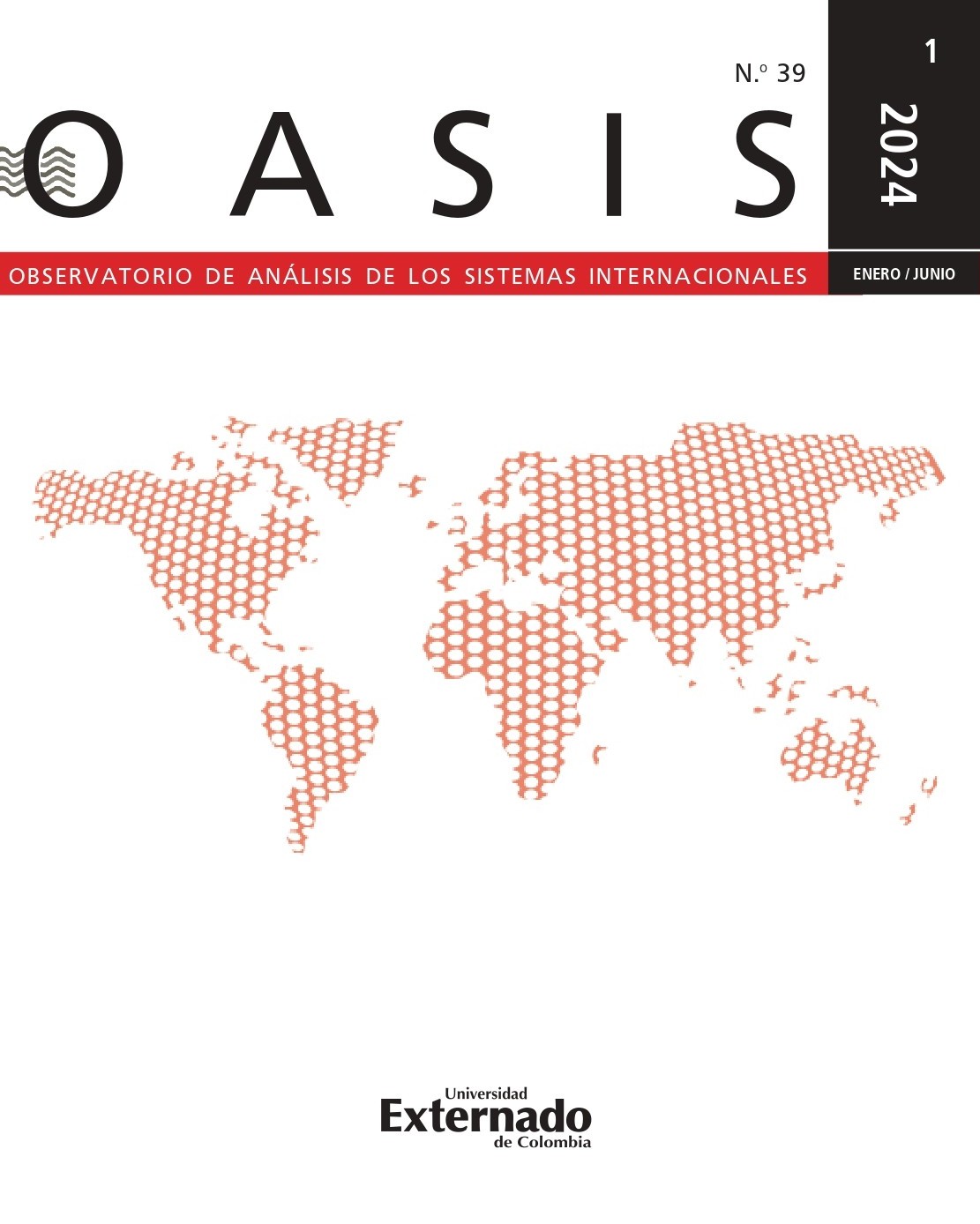The Turkish diplomatic strategy in Iraq: Shifts and continuities, 2003-2023
The Turkish diplomatic strategy in Iraq: Shifts and continuities, 2003-2023
Contenido principal del artículo
Resumen
Las relaciones entre Turquía e Iraq han conocido diferentes etapas entre 2003 y 2023. El objetivo de este artículo es analizar las constantes premisas y los hechos cambiantes de la relación entre los dos vecinos desde el punto de vista turco. De esta forma, se busca explicar cómo los aspectos económicos y las cuestiones de seguridad fronteriza están en el corazón de la diplomacia turca. A partir de la llegada al poder del AKP y de su líder Recep Tayyip Erdoğan, la visión turca y su estrategia en el Medio Oriente, e Iraq en especial, han conocido diferentes momentos. Esto ha dependido del contexto regional o del contexto doméstico turco, que a lo largo de los años ha demostrado una relación bilateral compleja, dependiente de varios factores.
Palabras clave
Descargas
Detalles del artículo
Referencias / Ver
Ahmadzadeh, H., & Stansfield G. (2010). The political, cultural, and military re-awakening of the Kurdish nationalist movement in Iran. The Middle East Journal, 64(1), 25.
Aksu, K. (2020). Turkey: A Regional Power in the Making. Cambridge Scholars Publishing.
Ari, C. T., & Munassar, O. (2020). Two stages of Turkey’s quest for a regional power status in the Middle East: An integrated role-status-seeking approach. Gazi Akademik Bakis-Gazi Academic View, 14(27), 1-29. https://search.trdizin.gov.tr/tr/yayin/detay/414146/two-stages-of-turkeysquest-for-a-regional-power-status-in-the-middleeast-an-integrated-role-status-seeking-approach
Azhari, T. (2023, May 27). Iraq launches $17 billion road and rail project to link Asia and Europe. Reuters. https://www.reuters.com/world/iraqlaunches-17bn-road-rail-project-link-asia-europe-2023-05-27/
Babacan, M. (2011). Whither an axis shift: A perspective from Turkey’s foreign Trade. Insight Turkey, 13,(1), 152.
Bozarslan, H. (1997). La question kurde : Etat et minorites au Moyen-Orient. Presses de Sciences Po. https://doi.org/10.3917/scpo.bozar.1997.01
Burdy, J., & Marcou, J. (2013). Le cheminement complexe des nouvelles relations turco-arabes. Herodote, 148, 8-22. https://doi.org/10.3917/her.148.0008
Cagaptay, S., Bache Fidan C., & Sancikara, E. C. (2015, February 25). Turkey and the KRG: Signs of Booming Economic Ties (Infographic) Washington Institute. https://www.washingtoninstitute.org/policy-analysis/turkey-and-krgsigns-booming-economic-ties-infographic
Casier, M., & Jongerden, J. (2011). Nationalisms and politics in Turkey: Political Islam, Kemalism and the Kurdish Issue. Routledge.
Cécillon, J. (2011). L’Irak, nouvel espace de déploiement de la puissance turque. In D. Schmid (Ed.), La Turquie au Moyen-Orient : Le retour d’une puissance regionale. CNRS Editions. http ://books.openedition.org/editionscnrs/12379
Cerny, H. (2018), Iraqi Kurdistan, the PKK and International Relations: Theory and Ethnic Conflict. Routledge.
Cheviron, N., et Pérouse, J. F. (2017). Erdogan, Pere de la Turquie? Ėditions François Bourin.
Denizeau, A. (2021, February 22). Les éminences grises de la politique étrangère de Recep Tayyip Erdogan. Editoriaux de l’Ifri. IFRI. https://www.ifri.org/fr/publications/editoriaux-de-lifri/eminences-grises-de-politique-etrangere-de-receptayyip-erdogan
Grojean, O. (2013). Théorie et construction des rapports de genre dans la guérilla kurde de Turquie. Critique internationale, 60, 21-35. https://doi.org/10.3917/crii.060.0021
Gunter, M. (1990). The Kurds in Turkey: A Political Dilemma. Westview Press.
Gurbuz, M. (2021). Turkey and the Gulf States: A New Era of Détente. Arab Center. https://arabcenterdc.org/resource/turkey-and-the-gulf-states-a-newera-of-detente/
Gürsel, S. (2013). Le basculement historique du commerce extérieur turc vers l’Orient. Herodote, 148, 183-196. https://doi.org/10.3917/her.148.0183
International Crisis Group. (2013). Syria’s kurds: A struggle within a struggle. Middle East Report, (136), 2.
Jabbour, J. (2020). La Turquie : une puissance émergente qui n’a pas les moyens de ses ambitions. Politique étrangère, 85(4).
Kafesoğlu, I. (1985). I. Turk/İslâm sentezi. Aydınlar Ocağı.
Kalkan S. (2011). The Transformative Power of the Turkish Private Sector in Iraqi Kurdistan. TEPAV. Evaluation Note, 201125. https://www.tepav.org.tr/en/yayin/s/410
Kazancigil, A. (2016). Turkish diplomacy in the Middle East: From success to failure. National Defence Review, 791, 42-48. https://doi.org/10.3917/rdna.791.0042
Kirdar, S. (2013). Erbil, Bagdad, Ankara et Washington : la course au pétrole en Irak du Nord. Herodote, 148, 103-116. https://doi.org/10.3917/her.148.0103
L´Orient-Le Jour. (2023, May 21). Les Kurdes d’Irak et de Syrie divisés sur une possible victoire d’Erdogan. L´Orient-Le Jour. https://www.lorientlejour.com/article/1338131/les-kurdes-dirak-et-de-syrie-divises-sur-une-possible-victoire-derdoganpapier-dangle.html
Library of Congress. (2013). Syria’s kurds: A struggle within a struggle. Middle East Report, (136).
Lundgren, A. (2005). La politique turque de la frontière. Confluences Mediterranee, 53, 79-90. https://doi.org/10.3917/come.053.0079
Marcou, J. (2019). La Turquie et ses nouveaux « alliés ». Orients Strategiques, (9).
Marcou, J. (2021). Les relations turco-irakiennes: de l’inconstance au ménage à trois. Confluences Mediterranee, 116, 147-156. https://doi.org/10.3917/come.116.0149
McDowall, D. (1996). A Modern History of the Kurds. I.B. Tauris.
Meier, D. (2022). Une géopolitique du Kurdistan irakien, entre frontières et conflits. Orients Strategiques, La question kurde dans tous ses etats, 12, 19. https://shs.hal.science/halshs-03894379
Merle, M. (1976). Politique intérieure et politique extérieure. Politique étrangère, 41(5), 420. https://www.persee.fr/doc/polit_0032-342x_1976_ num_41_5_1704
Ozkan, O. (2023, February 24). Why Was Turkey’s Military MIA After the Earthquake? Foreign Policy. https://foreignpolicy.com/2023/02/24/turkey-earthquake-erdogan-military-tsk-diasterresponse-reform-coup/
Özge, A. (2013). La Turquie: retour au Moyen-Orient. Herodote, 148, 33-46. https://doi.org/10.3917/her.148.0033
Parlar Dal, E. (2010). Between precaution and ambition, the neo-Ottomanism of the new foreign policy of the AKP in question. EurOrient, special issue, 35.
Picard, E. (1991). Irak, la question cruciale de l’autonomie. In E. Picard (Ed.), La question kurde (pp. 79-95). Complexe.
Quesnay, A., & Roussel, C. (2013). Avec qui se battre? Le dilemme kurde. In F. Burgat, & B. Paoli (Eds.), Pas de printemps pour la Syrie. Les cles pour comprendre les acteurs et les defis de la crise (2011-2013) (pp. 144-157). La Découverte.
Saadoun, M. (2022, April 7). Irak. Quand les cartes des alliances politiques sont rebattues. Orient XXI. https://orientxxi.info/magazine/irak-quandles-cartes-des-alliances-politiques-sont-rebattues,5501
Tejel, J. (2009). Syria’s Kurds. History, Politics and Society. Routledge.
Tinas, R. (2013). State and Religion in Post-Kemalist Turkey: The Evolution of the Justice and Development Party (Adalet ve Kalkınma Partisi, AKP): The two mandates: 2002-2007 and 2007-2011 (PhD thesis, Institut d’Etudes Politiques de Lyon), Lyon, France. http://www.theses.fr/2013LYO20020
Vita, L. (2020, September 2). Ecco cosa vuole la Turchia [This is what Turkey wants]. Inside-Over. https://it.insideover.com/politica/intervista-cemgurdeniz-turchia-mediterraneo-mavi-vatan.html
Yıldırım, G. (2022). Le rôle politique de l’armée turque : des coups d’État aux partenariats stratégiques avec le gouvernement. Confluences Mediterranee, 122, 47-63. https://doi.org/10.3917/come.122.0048
Zarcone, T. (2004). Modern Turkey and Islam. Flammarion.










